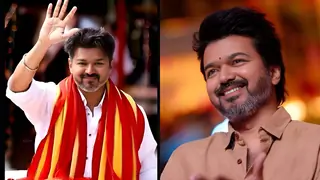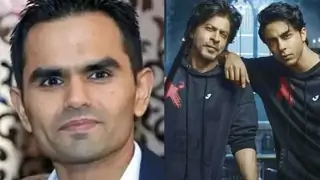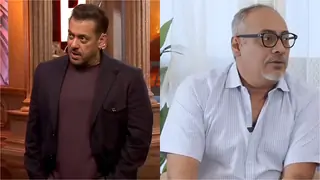| Those who get success easily don't know how to appreciate it' | |
| Adnan Sami shares the key to his. By Subhash K. Jha | |
| A truly cosmopolitan entertainer, Adnan Sami represents the triumph of true talent over geo-political considerations. It's hard to slot or classify this chubby musician who divides his time composing, singing and performing live. Adnan's superior throat and an innate sense of self-deprecating charm have aided his rapid ascent to the top of the charts. Q: Do you feel a sense of belonging within Mumbai's entertainment industry? The opportunities are endless here. There's enough work for everybody here. There's so much space for different flavours. Right now I've this icecream craving. And as the dialogue in my current favourite film, Black, goes, 'Life is an icecream. Enjoy it before it melts.' Life is an ocean and I plan to be a happy floating fish. Q: Lately, you've been judging a popular music talent contest. How does it feel to discover new voices? I think every established artiste needs to look beyond himself. I've faced rejection so many times in the past. I don't think there has ever been a single individual who hasn't faced the humiliation of rejection. I remember at age 16, I had sent a demo of my music to RCA records in the US. And the executive there ripped me completely saying I was no singer. When I came to India a decade ago, I went through the entire rigmarole of rejection. I'd be sitting in record companies for hours. One executive said, 'Well, the music is okay. But we should change the voice.' That was the worst blow. Now, when I see these hopeful contestants standing in front of me and that, too, in front of a camera where the whole world is watching them, it breaks my heart to say 'no' to them. Hardships are an essential part of growing as an artiste. Those who get success easily don't know how to appreciate it. Initially, I had major issues saying 'no' to any hopeful contestant. Gathering the strength to reject came from being true to my job. Q: How far is Indian showbiz open to new talent? A lot of people think I came out of nowhere to become a star. It doesn't work that way. Asha Bhosle encouraged me tremendously. In fact, I wanted to release my album from London. But she insisted I come to India. It wasn't easy to uproot myself from Toronto where I lived in a house with a swimming pool. Suddenly, I was in the deep-end of showbiz. Today with my motion-picture soundtrack of Lucky, I've fulfilled my long-standing dream of working with Lata Mangeshkar. I suggest every artiste work with her to take lessons in humility and self-deprecation. She's so full of love. Recording a song with her was a very emotional moment for me. I had grown up listening to and admiring her. To compose for and sing with her! Anyone who works with her for the first time is liable to nervousness and anxiety. But she made the recording such an amazing joy. Q: Is Lucky your first film score? I did a one-off song in a film called Yeh Raaste Hain Pyar Ke. But that was only because Madhuri Dixit wanted me to. She's a wonderful friend. And I couldn't say 'no' to her. Then I did one song for Dev Anand in his film, Love At Times Square, because no one says 'no' to Dev Saab. That score had several composers coming together. I don't really approve of this trend of composite scores. They give you the example of the West where they have several composers in compilation albums. But for a movie soundtrack it's always one music composer doing the entire album. You'll never see James Horner pitching in with John Williams…or for that matter, Madan Mohan with S.D. Burman. So why now? One composer knows the pulse of an album. Q: Do you enjoy the prospect of composing for Hindi films? Indian cinema is at such an exciting juncture. The crossover element that we've been talking about is finally here with Black. I've worked with Sanjay Bhansali's sister, Bela. She has directed my music videos. I love movies. I'm a huge movie collector. I love watching movies. But acting? Nah! Unless Sanjay Bhansali directs me. I really don't think I can act. I get to play so many roles in real life. I'm a composer, singer, live performer. They are all like different muscles in my body which I've to use. Q: Which 'muscle' do you enjoy using the most? It's live performances I enjoy the most. I make sure I give the audience something special to take home. Otherwise they have my CDs that they listen to at home. Whenever I do public shows I get an attentive audience. I'm about to embark on a world tour at the end of March for two-and-a-half months. I'll invite some very special guests to be part of it. We first go to the US, Canada, the UK and other parts of Europe. Then we go to Africa and the Middle East. It would be quite a rollercoaster ride. I'll be gone for a long time. I'm already missing Mumbai. Q: Do you enjoy being a ghost voice in Hindi cinema? When I see my voice on others, I'm amused at how they give expression to my words. I may mean one thing while singing. But they interpret it in a totally different way. It's interesting to see how different people respond to the same stimuli. What I enjoy is working with various wonderful composers. When I enter the studio to record for others I cease to be a composer. There are some composers who like me to improvise. I oblige. But I always have fun singing. I don't sing numbers I don't enjoy. I avoid vulgar songs. On a couple of occasions I couldn't figure out the double meaning. After I sang them I was very embarrassed. Q: Is life good to you? One has no choice but to put the personal and professional aspects in different compartments and not let them overlap. I went through an acute low in my life some years ago. I had reached a stage where I was completely destroying myself. I could've disappeared in a black hole of depression. There was so much more I wanted to do. I had to get out of it. Then I shook myself and picked up the pieces of my life. I handed over my troubles to God and left it to Him. And that method worked like magic. A lot of people ask me where the dard in my voice comes from when I am so jovial. There is pain and suffering in me. And that's an essential part of the creative process. If you haven't felt pain how are you going to hit those real and soul-stirring notes? I'd rather be pained than shallow. Q: Which country do you consider your home now? India is very much my home now. Initially uprooting myself was difficult. I had to start from scratch. Mumbai has been very warm and welcoming. I discovered my musical roots here. I learnt classical music from Pandit Shiv Kumar Sharma. I'm also a huge admirer of Ghulam Ali Khan. I also admire S.D. Burman, Madan Mohan and specially R.D. Burman. I met Ashaji and RD in London as a child. He was extremely responsive. At first when he heard my piano on the tape he didn't believe it was me. He said, 'Agar tumne bajaaya hai to bahut achchha bajaaya hai.' That was quite a compliment…You know, it's really strange. I've released so many albums, been there, heard it all. Now when my first motion-picture album, Lucky, is being released, I feel the same butterflies in my stomach that I did when my first album, Kabhi To Nazar Milao, was released. I'm very much a child when it comes to my music. I still run excitedly to my Dad to play my tunes. I've been doing that ever since I could remember. |



















